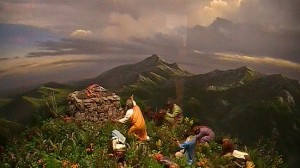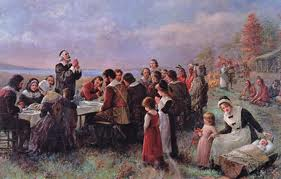“Give thanks and praise to the Lord and I will feel all right.”
–Bob Marley 1977
“Our harvest being gotten in, our Governor sent foure men on fowling;
so that we might after a more speciall manner rejoyce together, after we
had gathered the fruit of our labours.”
–Edward Winslow, Mort’s Relation (1622)
The Roots of Unthankfulness and Idolatry
Scripture doesn’t allow for a primitive polytheism that slowly evolved into a more civilized monotheism over time as liberals and modernists would have us believe. It teaches, rather, that man began with the knowledge of the one, true God and willfully suppressed it, then twisting and perverting that knowledge into polytheism and idolatry, expressing itself in an unthankful spirit. Scripture says that man became a polytheist and idolater by a culpable choice.
Paul pursues this theme in Romans 1. Man, he says, is confronted with the knowledge of God, the true God, indelibly inscribed in his own nature and written most profoundly across the face of all creation (v. 19). It has always been so, Paul insists. God’s divine nature and sovereignty have been manifest in the things He has made from the beginning of creation (v. 20).
 Interestingly, in all of human history there have been only two times when all men living acknowledged the reality of the Creator God and the validity of His claims upon mankind: in Eden after the Fall and on Ararat after the Flood. Men heard the promise of God and gave thanks for His mercy. But both times the thankfulness was short lived. And, within a few generations, men grew discontented with their Creator God. They knew God, but refused to give Him glory (v. 21). They grumbled about His laws and His providence. They complained about His nature and wished Him to be other than He was. Paul says simply that they weren’t thankful.
Interestingly, in all of human history there have been only two times when all men living acknowledged the reality of the Creator God and the validity of His claims upon mankind: in Eden after the Fall and on Ararat after the Flood. Men heard the promise of God and gave thanks for His mercy. But both times the thankfulness was short lived. And, within a few generations, men grew discontented with their Creator God. They knew God, but refused to give Him glory (v. 21). They grumbled about His laws and His providence. They complained about His nature and wished Him to be other than He was. Paul says simply that they weren’t thankful.
Since they weren’t happy with God as He was, they reinvented Him. They imagined that God was like man—or like the birds of heaven, or the beasts of the earth, or the snakes and beetles that crawl in the dust (v. 23). They gave form to their imaginations and carved icons and idols. They worshipped the works of their own hands, their own creative and reproductive energies. They also seemed quite drawn to worshipping sex and power.
Paul says that God gave them over to “reprobate” minds, minds void of judgment. If they would not distinguish God from beasts, He would abandon them to the full range of such foolishness. Paul describes in some detail the ethical degradation that sprang from man’s unthankful heart… fornication, greed, maliciousness, envy, murder, strife, deceit, insolence, pride, and much, much more.
And yet Paul insists that revelation of God in man (and creation) remains. I guess he wanted to make it “clear as a bell” that every man is without excuse for his unbelief and ingratitude (v. 20). And that every man knows God, but suppresses that knowledge in unbelief (v. 18); that is, in thanklessness.
Unthankful Wilderness Experiences
The people that Moses led out of Egypt were a thankless lot. For 40 years God led them through the wilderness. He shielded them from the desert sun by day and illumined their camp by night. He rained bread from heaven six days a week and ordained a holiday on the seventh. He split open rocks and poured out rivers of water in the desert. He came down on Sinai in thunder and lightning and gave them His law. He did this first by His own voice and then on of tables of stone, engraved by His own hand. God gave them a wise and selfless leader, a man who knew Him face to face. And in the light of such overwhelming revelation, care, and mercy, His people grumbled.
They grumbled about the lack of food and water; about the dangers of the Promised Land and about getting “heavenly bread” a little too often. They grumbled against the leaders God had given them. They grumbled against the judgment of God and mistook it for magic. And they all died in the wilderness—all but Joshua and Caleb. The Promised Land had no room for thankless whiners.
Opportunities For Thanksgiving
The wilderness flushes our hearts out into the open. It reveals us for who we are. Deprivation, weariness, pain, fear—all these trials and more strip away the superficial civility, the veneer of virtue, the pretense of godliness, with which we all too often cloak our thankless spirits.
“Touch all he has,” Satan said of Job, “and he will curse You to Your face” (Job 1:11). And sometimes God does take it all away. Sometimes He takes little bits away—this comfort, that luxury, these conveniences. He tests and tries us in what seems a wilderness so that we may know our own hearts. The thankless heart chafes and rebels. The grateful heart presses closer to God. In the end, the godly man says with Job, “The LORD gave, and the LORD has taken away; blessed be the name of the LORD” (Job 1:21).
The godly are thankful because they perceive the hand of God, the mercy and provision of their Lord, in their trials and tribulations. They see how God furnishes a table in the wilderness, how He rains manna from heaven and brings water from the rock. They learn in the midst of suffering that man doesn’t live by bread alone, but by every word of God (Deut. 8:3). This, of course, is a matter of faith. Those who trust God, thank God, even in the wilderness, even when it hurts.
Our Nation’s First Thanksgiving
 Nearly 400 years ago a band of Pilgrims found themselves cast upon the shores of a New World. They were very human, these hundred-odd Christian souls. But in the wilderness that was New England, they trusted God. And so, through starvation, sickness, and sorrow, they learned contentment. They learned community. They learned thankfulness. And when they had a chance, they set aside a day to rejoice together in God’s blessing. We call it the first Thanksgiving. They called it a way of life.
Nearly 400 years ago a band of Pilgrims found themselves cast upon the shores of a New World. They were very human, these hundred-odd Christian souls. But in the wilderness that was New England, they trusted God. And so, through starvation, sickness, and sorrow, they learned contentment. They learned community. They learned thankfulness. And when they had a chance, they set aside a day to rejoice together in God’s blessing. We call it the first Thanksgiving. They called it a way of life.
The Way Back
We can still recover that Pilgrim spirit. Our nation can still be brought back from the brink by rekindling a spirit of repentance and thankfulness. Thankfulness, not only for the good things we still have, but also for the adversity and the troubled times we have. Are you willing to say with David in Psalm 13:”But I have trusted in your steadfast love; my heart shall rejoice in your salvation. I will sing to the Lord because he has dealt bountifully with me.”
The world thinks it’s entitled. As Christians we know God doesn’t owe us anything.
Yet because of His grace, He loves us. And that’s a lot to be thankful for. Make it the best Thanksgiving ever by remembering just how much you have and sharing that spirit with everyone around you. He has indeed, dealt bountifully with us.
For Further Reading:
G. K. Chesterton, The Everlasting Man (New York: Image Books, 1955 [1925]).
Cornelius Van Til, Christian Apologetics (Phillipsburg, NJ: P&R Publishing, 2003).
John Piper, “Can God Spread a Table in the Wilderness?”, (1981), <http://www.soundofgrace.com/piper81/112281m.htm>.
Peter Marshall, Jr. and David Manuel, The Light and the Glory (Old Tappan, NJ: Fleming H. Revel Company, 1977).
Jeremy Dupertuis Bangs, “1621: A Historian Looks Anew at Thanksgiving,” Sail 1620 (2011), <http://www.sail1620.org/history/articles/121-looks-anew-thanksgiving.html>.
